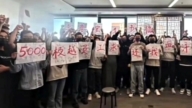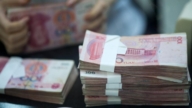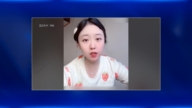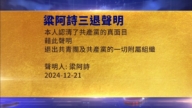【新唐人2014年09月22日訊】中國「21世紀網」被指涉嫌新聞敲詐之際,北京成立「新聞道德委員會」響應整頓,宣稱要打擊新聞業道德規範喪失的行為,加強新聞行業的監督和自律。評論認為,中國新聞媒體喪失職業道德的最大原因,是沒有新聞自由,一切按官方口徑。那麼,靠成立道德委員會,能解決這些問題嗎?請看報導。
北京市新聞道德委員會在9月16號成立,19名成員是來自北京市新聞單位負責人、專家學者或一線記者、編輯等。北京市記協主席梅寧華任道德委員會主任。
新華網宣稱,北京新聞道德委員旨在加強新聞行業的監督和自律,懲治腐敗。在新聞實踐中,恪守客觀、準確、公開、誠信的原則。
原河北人民廣播電臺編輯朱欣欣:「新聞媒體的客觀、公開、真實,首先是在於新聞媒體的自主權,報導的自由、自主權,不受各個政治力量來干涉,跟腐敗沒有完全的關係。現在最關鍵的、最大的腐敗是官方權力,一黨專制這個權力,對新聞媒體報導的干涉、控制和打壓,這才導致了一系列的在新聞界對於錢財這種貪腐。」
今年以來,央視多名高管及女主播因涉嫌「貪腐受賄」陸續帶走調查。 9月初上海的「21世紀網」也因為涉嫌新聞腐敗,包括網站主編在內的多人被抓捕。
朱欣欣指出,中國新聞媒體喪失職業道德的最大原因,是許多新聞不許報,一切按官方口徑,媒體幾乎變成官方的組成部份,導致按權力分贓、搞壟斷。
朱欣欣:「許多官方媒體,它本身就是擁有了一定特權地位,它是官僚機構,一黨專制權力的一個附屬品,也是它專制權力的一個延伸。有些媒體人就佔著這個虛有的特殊地位,以權謀私進行腐敗的活動,如果專制體制不除,媒體的這個腐敗現象也是很難徹底的遏制。」
朱欣欣表示,在中共一黨專制下,包括官方牽頭的民間組織,都是政府機構,所謂的「道德委員會」的人,自己都沒有職業道德,靠他們來解決道德問題很荒謬。
事實上,擔任北京市新聞道德委員會主任的梅寧華,本身就是位很受爭議的人物。梅寧華原來是《北京日報》社長,今年4月份退休。北京媒體界的很多人士稱他是「毛左」勢力的重要代表。大紀元報導,圍繞梅寧華身上的其它醜聞包括貪腐、生活作風、挺薄熙來等等。
原《杭州生活週刊》執行主編黃金秋:「如果說設立道德委員會能解決問題的話,我倒建議可以設立一個官員道德委員會,教師道德委員會,是不是避免教師姦淫學生,是不是避免這些官員貪污腐敗呢?這是一個很荒唐的邏輯。」
黃金秋認為,道德只能是制度之下、法治之外的思想行為規範,如果一個社會到處黑箱作業、權力獨尊,自然所有行業、所有資源都會見利忘義、喪失操守。
去年5月份河北、上海、浙江、山東、湖北5個省市,首批試點建立道德委員會,中共聲稱是「加強新聞隊伍建設,解決新聞界突出問題」的舉措。今年2月北京、黑龍江、福建、江西等10個地方也成立了新聞道德委員會。
朱欣欣認為,中共遲遲不出臺新聞法,卻在各地不斷增設新聞道德委員會,是為了收緊對媒體的箝制,試圖以整治新聞腐敗及假新聞等,進一步封殺批評中共的聲音。
採訪編輯/李韻 後制/舒燦
The CCP’s Media Ethics Watchdogs Are Useless Without Freedom of the Press, Experts Say
The 21st Century Business Herald website was allegedly
involved in “news blackmail.”
In response, Beijing established a media ethics commission
to “crack down on immoral news media actions”
and “strengthen supervision and industry self-regulations.”
Commentators say the key reason for the moral failure
of Chinese media is that there is no freedom of the press
under the Chinese Communist Party’s (CCP) governance.
If so, how can the media ethics commission
solve the problem?
On Sept. 16, Beijing established the Media Ethics
Commission.
It’s comprised of 19 members who are newspaper
executives, scholars, top journalists or editors.
Mei Ninghua, chairman of the Beijing Journalists
Association, will lead the commission.
Xinhua News Agency said the commission will “place more
emphasis on media industry ethics” and strike corruption.
“Media should be subject to the principles
of objectivity, accuracy, openness and honesty.”
Zhu Xinxin, former editor of Hebei Radio Station:
”Objectivity, openness and honesty of new media
are based on freedom of the press.
There should be no involvement in political power.
So the issue has nothing to do with corruption.
Currently in China, the most corrupt power is the CCP
and its one-party dictatorship.
It is the CCP’s control and suppression over news media
that lead to all corruption among news industry.”
In 2014, a number of CCTV directors and anchors
were investigated on corruption charges.
In early September, 21cbh.com, a Shanghai business news
website, was also put under investigation for corruption.
The editor-in-chief and many other employees were arrested.
Zhu Xinxin commented that the moral failure of Chinese
media is mostly a result of the fact that many news
is forbidden to be touched as all media have to obey
to the CCP’s official “instructions” of media reporting.
Chinese media thus become part of the CCP’s power,
and finally obtain benefits with their monopolistic role.
Zhu Xinxin: “Many official news agencies are given privileges.
They are bureaucratic and subordinate to the party’s
dictatorship system.
Therefore some media workers took advantage
of their special role and power to benefit themselves
throughcorrupt practices.
Without completely eliminating the dictatorship system,
the media’s moral problems can hardly be solved.”
Zhu said that under the CCP’s dictatorship, even the so-called
civilian-run organizations are indeed run by government.
They have to be led by official departments.
The members of so-called “Media Ethics Commission”
probably lack professional ethnics as well.
It is ridiculous to expect them to work on immorality.
Mei Ninghua, chairman of the new commission,
is a controversial figure himself.
Mei used to be head of Beijing Daily, and retired this April.
Many Beijing media workers called Mei a key figure
of the “Mao Leftist” group.
According to the Epoch Times, Mei was involved in corruption
scandals, lifestyle problems and supported Bo Xilai.
Huang Jinqiu, former executive editor of Hangzhou Life
Weekly: ”If setting up an ethics commission can solve
the problem, I would suggest setting up ethics commissions
for officials and teachers.
Will that make it much easier to eliminate corruption
or rapes against students?
Obviously this is a ridiculous argument.”
Huang Jinqiu commented that ethics only work
in conjunction with laws and regulations.
If hiding the truth and abusing power are ubiquitous
in a society, all of its members will seek personal interest
over anything else, including ethics.
Last May, ethics commissions were first experimentally
run in Hebei, Shanghai, Zhejiang, Shandong and Hubei.
The CCP claimed the move was to “construct better media
groups and solve outstanding issues in media practice.”
This February, another 10 provinces did the same,
including in Beijing, Heilongjiang, Fujian and Jiangxi.
Zhu Xinxin said that instead of enacting media practice laws,
the CCP chose to set up ethics commissions all over China;
the move was indeed to tighten control over media reports,
and further block criticism against the CCP in the name
of “cracking down on corruption and fabrication
of news media.”
Interview & Edit/LiYun Post-Production/ShuCan






























